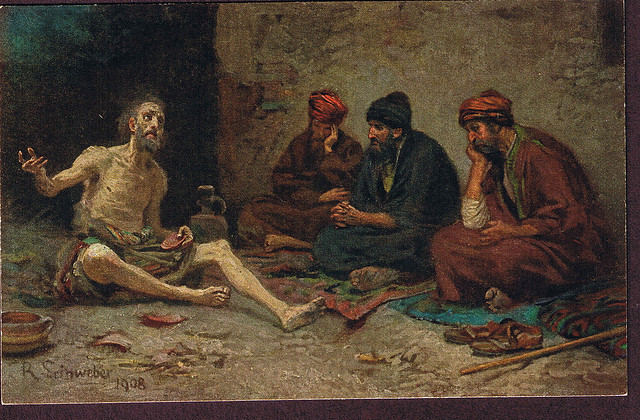Dear Child of God,
Salutations in the name of our Father in heaven.
Something has been weighing on my mind recently and I would like a few minutes of your time to discuss it, so please indulge me.

As human beings, we are subject to vanity and in some cases we become obsessed with being better than the other. We tend to present our ways and beliefs as better or superior; perhaps until we know otherwise. Strangely, Christians are not exempt from this, as there is an underlying Christian belief that we alone have the sole right to be called Children of God and ultimately gain access to paradise in heaven – either when we die or when the rapture occurs. For we uphold the concept that it is only through belief in Jesus Christ that any one could be called a Child of God and have eternal life. Anyone who is not a Christian, whether they do so consciously or unconsciously, is destined to a life of eternal damnation.
The subtle, but equally potent, message that is sent out with this doctrine is this – if someone has not chosen Jesus, you know better than them and if you can not convert them, steer clear. This message, my brethren, is what bothers me.
You see, I understand that this mode of thought is not without Biblical basis. For in the book of John, [1]John 1:10-13 we are told that only those who receive Christ are given the right to become children of God, in Romans that only through faith in Jesus can we obtain salvation [2]Romans 10:9-10 and in Galatians [3]Galatians 3:26 that by faith in Jesus we are made children of God. Apostle Paul puts it most succinctly in his second letter to the Corinthians “Be ye not unequally yoked together with unbelievers: for what fellowship hath righteousness with unrighteousness? And what communion hath light with darkness? And what concord hath Christ with Belial? Or what part hath he that believeth with an infidel?” [4]2 Corinthians 6:14-18 Unfortunately, these verses have formed the foundation upon which this very “Christian” doctrine of discrimination, separation and vain glory has been built. However, a holistic reading of the Bible will demonstrate that this could not possibly mirror what God intended for the world, or what Christ meant for his church. Especially because this separatist doctrine is completely antipodal to the teaching and practices of Christ; the man whom Christianity is meant to be fashioned after.
We should concern ourselves with following Jesus and walking according to the principles he laid down for us, instead of looking at what we consider as sinful or of disrepute in the lives of others.
Let’s look at Jesus’ example. We are told that he was usually found in the company of tax collectors and sinners; company that the righteous and holy in his society found abominable to keep. [5]Mark 2:16 When faced with judging the woman who had committed adultery, Jesus’ response was not to cast her away but to demonstrate that she was just like every one of her accusers. Or better still, that all her accusers were just like her, by asking the one without sin amongst them cast the first stone. [6]John 8:1-11 Jesus not only interacted with the sinner, but defended her and upheld her humanity. As part of his famous Sermon on the Mount [7]Matthew 5-7, Jesus admonished the multitudes to ‘be like their Father in heaven’, ‘to be perfect even as their Father in heaven was perfect,’ and when praying to start by saying ‘Our Father in heaven.’ He did not conduct a mini poll in the midst of the multitude to find out who really believed in him or who had confessed him as their personal Lord and Saviour before teaching them how to live a life in connection with God. As far as he was concerned, all who sat before him were sons and daughters of his Father in heaven; children of God.
But Jesus didn’t stop there. In addition to demonstrating the universality of his doctrine and love, he asked his disciples not to judge, [8]Matthew 7:1-2; Luke 6:36-37 look down on or even concern themselves with the end of others. In Matthew 7:3-5 Jesus asked that instead of concerning ourselves with the speck in our brother’s eye, we should take out the log in ours, and in the final pages of the book of John, we see him instructing Peter to mind his own business or calling and not concern himself with the future of another disciple. [9]John 21:20-22
Taking a leaf from this story, we Christians should be busy concerning ourselves with following Jesus and walking according to the principles he laid down for us, instead of looking at what we consider as sinful or of disrepute in the lives of others. And what are these principles, we might ask? Well, quite simply, loving the Lord your God with all your heart, soul and mind; and loving your neighbour as yourself. [10]Luke 10:25-37 Jesus goes on to describe the neighbour as a Samaritan, primarily to demonstrate that God was not interested in maintaining the walls of difference that society had built. Jesus did not, and still does not want disciples who allow the prejudices of social, religious or moral class deter or distract them from doing the work of his father. What was important to him was that we did not discriminate in doing good – it was not limited to the Christian or the believing neighbour. It was to everyone, pure and simple.
The idea that it is only through accepting Jesus and becoming born-again that we become valuable to God must be fundamentally flawed.
Like the examples of Jesus in the New Testament, we have a plethora of Old Testament verses where God instructs the Israelites to be hospitable to the stranger, [11]Exodus 22:21-22; Leviticus 19:33-34; Deuteronomy 10:19 defend the oppressed, fight for the fatherless and plead for the widows. [12]Isaiah 1:17 In fact the concept of tithing as originally ordained was for the Israelites to come and eat before the Lord of their increase and share this with the Levite, stranger, fatherless and the widow within the society. [13]Leviticus 14:22-29 It was not intended to be used as a tool to sow and reap great blessings, but a tool to lift up the society as a whole – to positively impact the lives of those around them irrespective of their religious or moral beliefs. Also there is the prophecy in the book of Isaiah where God described Egypt as his people, Assyria as the work of his hands, and Israel as his inheritance. [14]Isaiah 19:22-25 In other words, the fact that the people of Israel were in a covenantal relationship with him did not make them better or superior to the people of other nations in God’s eyes. They were all equally important to him.
Going by the scripture quoted above, the idea that it is only through accepting Jesus and becoming born-again that we become valuable to God must be fundamentally flawed. Furthermore, the idea that being a Christian gives you a free pass to discriminate against and separate yourself from people of differing religious beliefs or moral orientation can only be absurd. This our exclusivist approach to a relationship with God has caused some Christians to abdicate their God-given responsibility to humanity and has instead endowed them with an increased sense of pride; an attribute that the bible teaches is abominable in God’s sight. [15]Proverbs 6:16-19 Even if we argue that ultimate goal of this very Christian attitude is to shine light on sin and convert the sinner, the Bible teaches that the power of conversion is not in our hands but in the hand of God; as only he has the power to change the heart. [16]Ezekiel 36:26-27 Therefore, all we can do is spread the gospel of Jesus through our teaching and our acts of love and let God do the rest.
Our heavenly Father expects us to embrace the entire tapestry of humanity, because being a child of God transcends religious belief, moral persuasion and societal acceptance.
Our heavenly Father expects us to embrace the entire tapestry of humanity – whether rich, poor, Christian, Muslim, Hindu, Jew, thief, murderer, prostitute or sinner. To remember that we all are valuable to Him and as such we should value each other; because being a child of God transcends religious belief, moral persuasion and societal acceptance. In his prayer for his disciples, [17]John 17:14-18 Jesus asks the Father to keep his disciples in the world and not to separate them from it, even though they were different. As such, I suggest that we do not separate ourselves from the world and the people in it that we have been called to love and impact for Christ.
What say you?
References
| ↑1 | John 1:10-13 |
|---|---|
| ↑2 | Romans 10:9-10 |
| ↑3 | Galatians 3:26 |
| ↑4 | 2 Corinthians 6:14-18 |
| ↑5 | Mark 2:16 |
| ↑6 | John 8:1-11 |
| ↑7 | Matthew 5-7 |
| ↑8 | Matthew 7:1-2; Luke 6:36-37 |
| ↑9 | John 21:20-22 |
| ↑10 | Luke 10:25-37 |
| ↑11 | Exodus 22:21-22; Leviticus 19:33-34; Deuteronomy 10:19 |
| ↑12 | Isaiah 1:17 |
| ↑13 | Leviticus 14:22-29 |
| ↑14 | Isaiah 19:22-25 |
| ↑15 | Proverbs 6:16-19 |
| ↑16 | Ezekiel 36:26-27 |
| ↑17 | John 17:14-18 |


